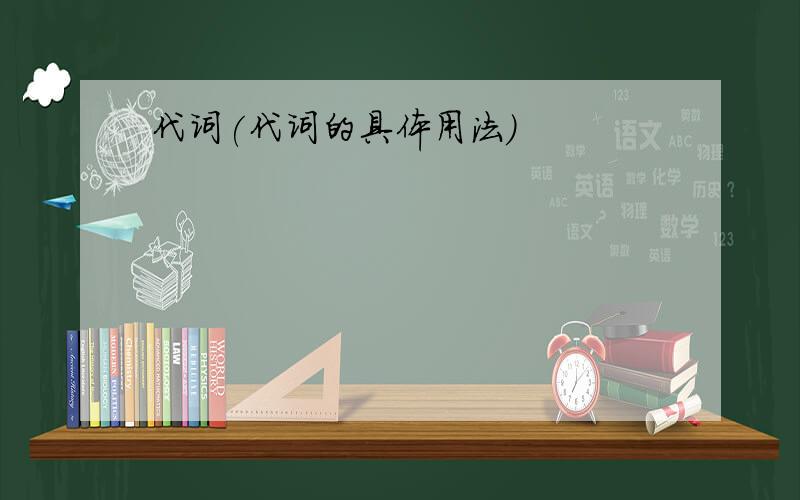代词(代词的具体用法)
来源:学生作业帮 编辑:神马作文网作业帮 分类:英语作业 时间:2024/11/10 19:21:47
老师我想问您一下代词的具体用法,我老弄错。

解题思路: 通过分析确认是否为代词,然后考虑为哪类代词,这类代词用的时候应该注意的问题。 再 结合句子结构考虑用哪种形式。
解题过程:
在初中阶段常用的代词有人称代词,物主代词,指示代词,反身代词,疑问代词,不定代词。
1. 英语有下面这些人称代词:
单数
复数
一
二
三
一
二
三
主格
I
you
he she it
we
you
they
宾格
me
you
him her it
us
you
them
人称代词作主语时用主格:
I am(We are)learning English. 我(们)在学英语。
Do you live here? 你住这儿吗?
Where is he(she)(are they)from? 他(她,他们)是哪儿人?
作宾语或介词宾语时通常用宾格:
Tell me(us)your name. 告诉我(们)你的名字。
We are proud of him(her, them). 我们为他(她,他们)感到骄傲。
作表语时用宾格时较多:
Who’s knocking at the door? — It’s me. 谁在敲门?——是我。
2. 物主代词有下面这些:
我的
你的
他(她,它)的
我们的
你们的
他们的
形容词型
的物主代词
my
your
his, her, its
our
your
their
名词型的
物主代词
mine
yours
his, hers, its
ours
yours
theirs
形容词型的物主代词只能作定语,如:
This is my(our)room and that is her(their)room. 这是我(们)的房间,那是她(他们)的房间。
名词型的物主代词在句中可用作表语、主语、宾语:
This book is mine, and that one is yours(hers). 这本书是我的,那一本是你(她)的。
Their apartment is bigger than ours(yours). 他们的住房比我们(你们)的大。
Let’s clean your room first, and ours(his)later. 咱们先打扫你的房间,再打扫我们(他)的房间。
3.反身代词有下面这些:
单数
myself
yourself
himself, herself, itself
复数
ourselves
yourselves
themselves
Did you enjoy yourself at the party? 晚会上玩得好吗?(常用反身代词做宾语的动词有buy oneself ,,hurt onself , learn...by oneself .teach oneself ,enjoy oneself ....)
Let me tell you a little about myself. 让我给你谈谈我自己的情况。
I am not quite myself these days. 近来我身体不太舒服。
The theory itself is all right. 这理论本身没有问题。
You can go and ask her yourself. 你可以自己去问他。
4.指示代词:
指示代词主要是this, that, these, those,
This(That)is my office. 这(那)是我的办公室。
These(Those)are the problems we want to discuss. 这(那)些都是我们想讨论的问题。
Put this(that)on the upper shelf. 把这(那)放在上一格上。
5.疑问代词有who, whom, whose, which和what, 都是用来构成疑问句的:
Who is calling? 谁打电话来?
Whom do you want to speak to? 你想找谁接电话?
What’s your address? 你的地址怎样写?
Whose is better? 谁的好一些?
Which of these is yours? 哪一本是你的?
6.英语中不定代词很多,主要有:
1)both, either, neither:
这几个代词都谈两者的情况。both表示“两者都…”,neither表示“两者都不…”,either表示“两者中随便哪个(都)”。
2)every, everybody, everyone, everything, each这些词做主语用单数形式。
3)no one, none, no, nobody, nothing这几个本身表示否定。
4)some, any, somebody, anybody, something, anything;someone, anyone;这些词中有some的一般用在肯定句中,有any的常用语否定句和疑问句中。
5)little,接不可数名词, few, 接可数名词复数,much接不可数名词, many接可数名词复数;
6)other其他的, another不定数目中另一个。
再 有不清楚的可以添加在讨论中,我会给你更细致地解答的。加油哦!
最终答案:略
解题过程:
在初中阶段常用的代词有人称代词,物主代词,指示代词,反身代词,疑问代词,不定代词。
1. 英语有下面这些人称代词:
单数
复数
一
二
三
一
二
三
主格
I
you
he she it
we
you
they
宾格
me
you
him her it
us
you
them
人称代词作主语时用主格:
I am(We are)learning English. 我(们)在学英语。
Do you live here? 你住这儿吗?
Where is he(she)(are they)from? 他(她,他们)是哪儿人?
作宾语或介词宾语时通常用宾格:
Tell me(us)your name. 告诉我(们)你的名字。
We are proud of him(her, them). 我们为他(她,他们)感到骄傲。
作表语时用宾格时较多:
Who’s knocking at the door? — It’s me. 谁在敲门?——是我。
2. 物主代词有下面这些:
我的
你的
他(她,它)的
我们的
你们的
他们的
形容词型
的物主代词
my
your
his, her, its
our
your
their
名词型的
物主代词
mine
yours
his, hers, its
ours
yours
theirs
形容词型的物主代词只能作定语,如:
This is my(our)room and that is her(their)room. 这是我(们)的房间,那是她(他们)的房间。
名词型的物主代词在句中可用作表语、主语、宾语:
This book is mine, and that one is yours(hers). 这本书是我的,那一本是你(她)的。
Their apartment is bigger than ours(yours). 他们的住房比我们(你们)的大。
Let’s clean your room first, and ours(his)later. 咱们先打扫你的房间,再打扫我们(他)的房间。
3.反身代词有下面这些:
单数
myself
yourself
himself, herself, itself
复数
ourselves
yourselves
themselves
Did you enjoy yourself at the party? 晚会上玩得好吗?(常用反身代词做宾语的动词有buy oneself ,,hurt onself , learn...by oneself .teach oneself ,enjoy oneself ....)
Let me tell you a little about myself. 让我给你谈谈我自己的情况。
I am not quite myself these days. 近来我身体不太舒服。
The theory itself is all right. 这理论本身没有问题。
You can go and ask her yourself. 你可以自己去问他。
4.指示代词:
指示代词主要是this, that, these, those,
This(That)is my office. 这(那)是我的办公室。
These(Those)are the problems we want to discuss. 这(那)些都是我们想讨论的问题。
Put this(that)on the upper shelf. 把这(那)放在上一格上。
5.疑问代词有who, whom, whose, which和what, 都是用来构成疑问句的:
Who is calling? 谁打电话来?
Whom do you want to speak to? 你想找谁接电话?
What’s your address? 你的地址怎样写?
Whose is better? 谁的好一些?
Which of these is yours? 哪一本是你的?
6.英语中不定代词很多,主要有:
1)both, either, neither:
这几个代词都谈两者的情况。both表示“两者都…”,neither表示“两者都不…”,either表示“两者中随便哪个(都)”。
2)every, everybody, everyone, everything, each这些词做主语用单数形式。
3)no one, none, no, nobody, nothing这几个本身表示否定。
4)some, any, somebody, anybody, something, anything;someone, anyone;这些词中有some的一般用在肯定句中,有any的常用语否定句和疑问句中。
5)little,接不可数名词, few, 接可数名词复数,much接不可数名词, many接可数名词复数;
6)other其他的, another不定数目中另一个。
再 有不清楚的可以添加在讨论中,我会给你更细致地解答的。加油哦!
最终答案:略